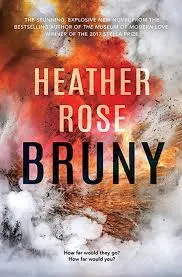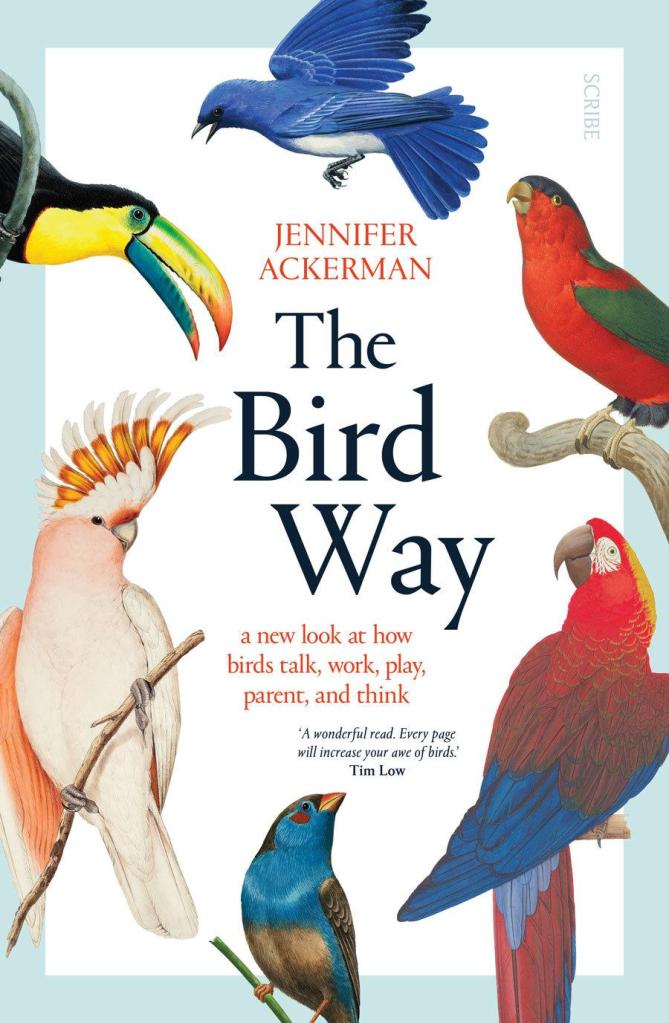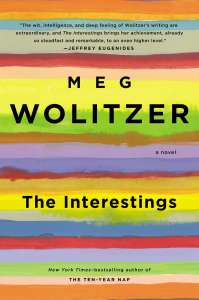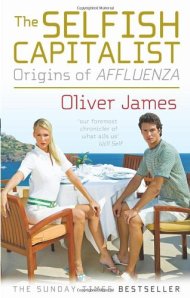Book club selections:
In 2019 I joined a book group, a fabulous circle of keen readers from a variety of professions. The group continued in 2020, albeit with adjustments for restrictions due to coronavirus. For many months, we met virtually via Zoom, and it was a highlight of my reading life during two waves of lockdowns to share reading and conversation with this group. The following titles were read with this book group, so the notes include, for some texts, a sense of the discussion among the group members about the book.
Bruny – Heather Rose (Fiction)

Astrid Coleman is a professional negotiator and mediator. When a bomb partially destroys a bridge under construction in the waters between Tasmania and Bruny Island, she is called home from New York by her brother, Tasmania’s Premier. What follows is an intriguing tale about political and family loyalties. Part conspiracy theory, part political and family drama, the novel at times veers into preaching, as the reader is privy to Astrid’s political views and analysis of what really is at stake in the wake of the bombing. This was a page turner that achieves its effect by magnifying current political realities and anxieties in Australia’s domestic and foreign affairs.
Educated – Tara Westover (Memoir)

Westover’s memoir of her childhood growing up with a family devoted to a survivalist sect of the Mormon Church was absolutely gripping, but also a book that gave many people in the book group nightmares. Westover’s father, in particular, is portrayed with such vivid outlines that the unique combination of menace and love he stands for astonishes. This memoir explores how extremes of abuse and paranoia can shape a whole family dynamic. The constant homestead and work accidents, and the refusal of mainstream health treatment for both parents and children, scars them both physically and psychologically. The text is also an up-close exploration of how, in patriarchal belief systems, the abuse of girls and women can always be excused or explained away. Westover’s story of eventually deciding to opt for an education and her own life, and the sheer difficulty of asserting her own story in the face of family pressure to disown her perceptions, was a searing read. Westover’s family has disputed some of the details of this book, but even if it were only a third true, it would still be shocking.
Less – Andrew Sean Greer (Fiction)

This was a re-read for me and it was as enjoyable the second time around. Arthur Less, the novel’s protagonist, is a middling novelist in middle age. His main claim to fame is that he was once the younger lover of a famous poet from a previous, and much-feted, generation of writers. Now nearing fifty, Arthur Less has ever since avoided full-hearted commitment to anything, including his sometime lover of thirteen years. When his lover announces his impending marriage – to someone else — Less decides to flee rather than attend the ceremony. What follows is a tragi-comic pilgrim’s progress to every minor literary event, prize, conference and interview that the hapless protagonist can find as Less uses these occasions to string together a globe-trotting itinerary that allows him to evade the wedding, and, it seems, the pertinent existential questions it implicitly poses. Greer made me care for his anti-hero, even as I cringed at his gauche interactions with others and laughed out loud at his misadventures. The novel is more than just diverting, however, as it ends up being a meditation on love, work, and aging.
A Gentleman in Moscow – Amor Towles (Fiction)

Count Alexander Rostov is sentenced to lifetime house arrest in Moscow’s Metropol Hotel by a Bolshevik tribunal. His alleged crime is to be a landed aristocrat, but his sentence is commuted from execution to house arrest because he is the author of a revolutionary poem. What follows is a capsule history of Russia through the perceptions of Rostov in his limited sphere. He avoids despair by seeking wonder, cultivated pleasures, and usefulness. He eventually becomes a waiter in the hotel restaurant, finds firm friendship among the hotel’s staff, and becomes the good friend of a young girl, Nina. Towles’ artistry is in portraying beautiful scenes and interludes that, in a very Russian way, blend comedy and poignancy. This novel is as bittersweet as a strong, late night coffee.
My Brilliant Friend – Elena Ferrante (Fiction)

This was another re-read for me, and it was just as absorbing the second time around. Elena, or Lenu, becomes friends with Lila, a sharp-witted and wilful girl from the same poor neighbourhood on the outskirts of Naples in the 1950s. What follows is a sharply observed portrayal of life in a close-knit and violent community where the crimes committed during the war and the ongoing influence of the camorra overshadow the present. Elena is studious and succeeds at academics, but despite this sees herself as merely hardworking when compared to the quicksilver brilliance of her friend. She has to challenge attitudes towards female academic achievement to reach her goals to free herself through education. Ferrante’s novel, the first of her Neapolitan Quartet, portrays an Italy in the process of modernisation via an intense focus on friendships and family ties.
A Room Made of Leaves – Kate Grenville (Fiction)

Grenville expands on territory she has already made her own – historical fiction about the early years of the Australian colony. Her latest novel centres on Elizabeth Macarthur, wife of the wool baron John Macarthur. The conceit Grenville employs is that the secret memoirs of Elizabeth Macarthur have been found in the rafters of her house, Elizabeth Farm. These memoirs contradict the bland and mask-like letters home that are the official record of Elizabeth Macarthur’s life. Grenville asks the reader to consider how the merino sheep business that John Macarthur was most famous (and notorious) for – he was a well-known bully – flourished even when he served two lengthy sentences in English prisons. The answer Grenville proposes is that his wife was the one who actually had the knowledge and enterprise to breed the merino sheep to begin with, and to manage the flock thereafter. Grenville portrays colonial Sydney with an acute awareness of Elizabeth’s problematic position as a woman in a violent, masculine, colonial world, even as she notes, as she has in her previous fiction, the significance of the Indigenous Australian people and culture. The Room Made of Leaves provoked a discussion about the representation of the past and Australia’s history, and how difficult it is to know for certain what figures from the past were really like.
The Bird Way – Jennifer Ackerman (Non-fiction)

Ackerman’s text was one of those books that I would not have taken off the shelf on my own, but I was glad to have been exposed to a different sort of reading experience through someone else’s selection. Once I got past the sense that facts were being piled up in a bewildering array I enjoyed the way that Ackerman focused on some aspect of bird behaviour – territory defence, mating, parenting and play – and created amazing portraits in words of the astounding variety and intelligence of birds. I particularly enjoyed learning about the species of Australia (of which there are many in this book). My favourite parts were those concerned with ravens, the playful (and destructive) kia of New Zealand, and the Australian magpie.
Island – Alastair MacLeod (Short stories)

MacLeod’s stories are set among the Scots immigrants and their descendants in the Cape Breton area of Nova Scotia. The landscape and its rugged, austere beauty is as much an actor in his stories as the people, as they battle the elements to carve out a living in fishing, farming and coal mining. Many stories deal with family and the ties that bind and sometimes sever as the harsh environment takes its toll and generations leave in pursuit of other ways to make a living. There is an elegiac quality to these stories, documenting as they do a way of life that has since disappeared. The writing is beautiful and spare.
The Yield – Tara June Winch (Fiction)

Wiradjuri author Tara June Winch released her much-anticipated second novel this year, and the book group were keen to read it. August Gondiwindi is on the cusp of thirty and returns from Europe when her Grandfather Albert “Poppy” Gondiwindi dies. The journey brings her back to Massacre Plains in Wiradjuri country, to confront the unanswered traumas of her past and the need for roots. The novel is divided into three parallel strands – the story of August’s journey; the dictionary of Wiradjuri words compiled by Albert Gondiwindi; and a long epistle and testimonial from a missionary who ran the Aboriginal mission in Massacre Plains, but was eventually interred himself as a German born man during the war. Through this complex structure, Winch addresses issues such as intergenerational trauma, the role of the past in shaping the present, family ties, the power of language, and the search for identity. When the fictional mining company RinePalm claim rights to mine on the Gondiwindi land, August is propelled to search for evidence of a past that will generate a stronger counter-claim on behalf of her people. In its portrayal of rural life in early to mid twentieth century Australia, especially the ambiguous role of Aboriginal missions, this book is undertaking important cultural work and helping Australians of settler background understand more of the Indigenous experience.
When I look across the titles over the year, I can see that many were concerned with the past, particularly the relationship between individual experience and identity, and larger historical realities. We also had our fair share of Australian texts — even Ackerman’s text had a great deal to teach us about Australian birdlife. I look forward to another year of conviviality and reading with the group in 2021.
















